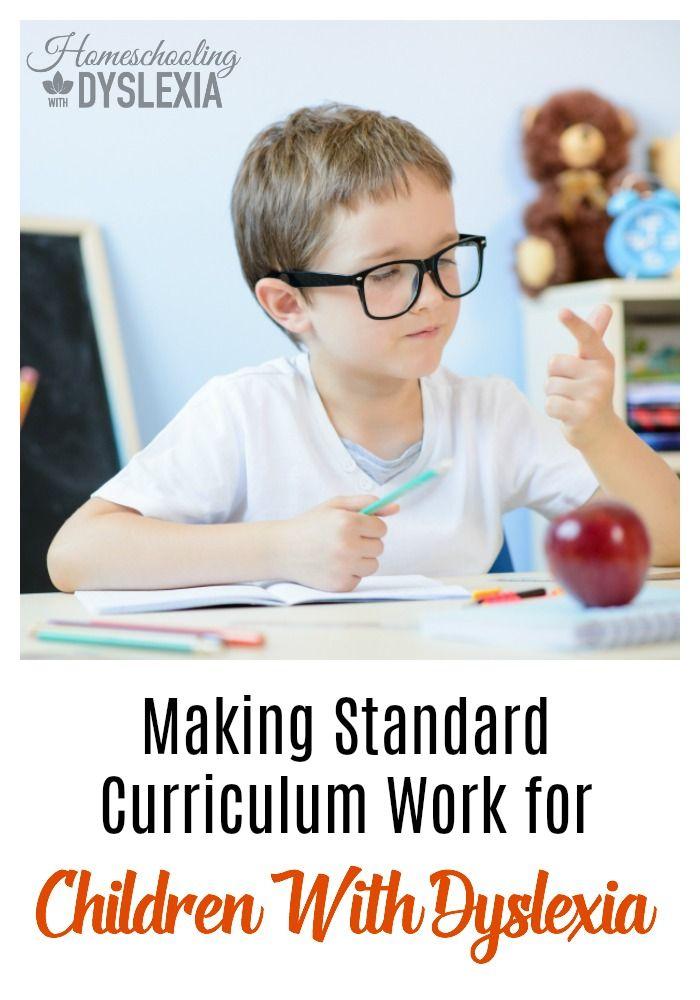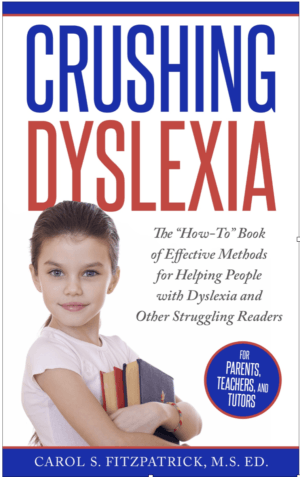There are so many great curricula out there for us to choose for homeschooling our children, but what about kids who struggle with dyslexia – are we stuck using only materials they can read? Do we need to throw away all the curriculum they can’t read?

This article is brought to you by Carol S. Fitzpatrick of Crushing Dyslexia. I had the privilege of meeting Carol at a special needs homeschool conference in her home state of Arizona recently. Carol has over 35 years of experience teaching struggling learners and has a ton of wisdom. I hope you love her as much as I do!
How to Make Accommodations for Our Strugglers
When we teach children with dyslexia to read, it is necessary to use books and materials that are written at a reading level where they can succeed; but what about science and history… and all the other wonderful subjects? How boring school becomes if every subject must be brought down to our strugglers’ reading levels! Talk about killing the love of learning! (And it doesn’t help family relations, either!)
Moms and dads need to ask this question when planning a lesson, “What am I trying to teach?” If it’s the mechanics of blending sounds, or the structure of a sentence, then yes, we need to teach at our children’s academic success level. But, if we want our children to get excited about a lesson in any other subject, we need to teach to their intelligence level. So how can we help them? One thing we can do is make accommodations.
What is an Accommodation?
Making a teaching accommodation means changing something about how the curriculum is taught, but not changing the curriculum itself. We don’t need to throw away all those curriculums that didn’t work – we need to adapt them so our kids can learn from them.
Simple Curriculum Test
If we read a passage to our children and they understand what is read, then that material is at a good level – we just need to adjust how we present it. We need to make an accommodation.
On the other hand, if our children don’t understand what we read to them, that material is too difficult and we need to adjust the curriculum. Either we need to modify it until they can understand, or find an easier curriculum.
Most of the time, a few simple adjustments will allow our dyslexic children access to the same information that other children experience. That’s our goal! We need to level the playing field so our kids can learn.
The Importance of Success
If our children have been struggling with reading, they have probably become discouraged. Before any accommodation will work, we need to discuss how to motivate children who have given up. This is one of the hardest tasks we face, but a little success works wonders.
To get children excited about learning again, we have to take them back to a level where they feel safe…where they can’t fail. Using accommodations is one of the best ways to do this. Once they are willing to try again, we can start raising the level of difficulty little by little with all the support they need to succeed until those tasks become easy, too.
Read More: “Finding Your Student’s Success Zone”
The Process
The way to convince our resistant learners to try once more is to turn up the heat a little bit at a time. If our children can’t read a passage alone, we read it in unison with them. If they can’t write a paragraph, we ask them to write one sentence. If they can’t write a sentence, we let them dictate one to us. If even that is too hard, we write one with them and discuss what we are thinking as we go along; we model how it’s done.
I can hear some people saying, “You’re ‘dumbing down’ your lesson,” but that’s not true! The intensity of the passage is no different, only the child’s access to the lesson has changed. There will come a day when we take that extra support away because they won’t need it anymore. This gradual baby-step-by-baby-step approach will help them conquer their disability much faster than demanding children read or write something when they don’t believe they can. (What person with any intelligence is going to keep trying to do something he or she believes is impossible?)
Simple Accommodations that Work
First, we need to take a step back and look at the specific things that are causing failure and frustration. Is it poor decoding ability? Or the impossibility of getting thoughts out on paper? Are our children so distractible we can’t get them to focus for more than a minute? Whatever it is, we need to find ways to “accommodate” our teaching to fit their need. Homeschoolers have such an advantage here, we can do this better than any school. We just need a little direction toward methods that will work.
Accommodations for Poor Reading Ability
Our children with dyslexia get so tired of reading, but they need to practice it for real, and not just listen. This is one of those times a parent needs to decide what is the goal of the lesson. If it’s a history lesson, maybe just listening is fine. But if the goal is to improve reading, then the kids need to be reading. Here is one technique that works well.
Unison Reading (A.K.A. Paired Reading, Partner Reading, etc.)
This means reading aloud together at the same time, not taking turns. Actually, you will read a book in a natural speaking voice (just a little slower than normal talking speed) and your child will echo slightly after you. This simple change supercharges a typical practice into a powerful, multisensory-simultaneous technique because your child is seeing the word, hearing it read correctly, and his or her speech muscles are moving, too. Three learning pathways (visual, auditory, and kinesthetic) are working at the same time. Doing this for ten minutes a day in a book your child likes can make a huge difference.
Listening
If the goal is not reading improvement, there are many ways to let your child hear the book:
- Read it to him or her, (or have someone else read it: older sister, grandma, etc.)
- Find a recording of it (consider Learning Ally or Audible)
- Make a recording yourself if it’s something that your children will need more than once.
TIP: All of these suggestions are made more effective if your child reads out loud while listening.
Read More: “Paired Reading and Dyslexia”
Accommodations for Poor Writing Ability
Scribe
Be your children’s scribe. Let them dictate to you. As they become more proficient, you will do less and less writing until they don’t need your help.
Shorten writing assignments
Cut down the length of writing assignments or do small chunks at a time.
Underlining Option
Spelling is a HUGE issue for our kids, so take it off the table. I allow my strugglers to write any word they want when trying to get their thoughts out on paper, and the spelling doesn’t count against them if they underline it. The quality of their writing improves dramatically when they don’t limit their writing to the words they know how to spell. (We can go back later and discuss how to spell the underlined words.)
Accommodations through Assistive Technology
There are so many wonderful new ways to help our kids achieve success through technology. These are some of the best accommodations! We shouldn’t hesitate to teach our children how to use them, even if it means we have to learn a new technology ourselves. For example, learn how to use voice-to-text together. By the way, it’s free on Google Docs. Search for “Voice Typing.” That’s just one of the great ones for people with dyslexia.
Read More: How to Teach Kids to Use Assistive Technology
Other Examples of Accommodations
There are many disabilities that keep children from learning easily.
- They read slowly (poor processing speed) – give extended time, especially on tests.
- They also have ADHD – allow your children to move around while learning, keep lessons short, develop a gentle signal to draw attention back to your lesson (I would touch my son’s shoulder.) Some kids actually focus better when listening to music.
- They have test anxiety – Let them take the test orally while you write down the answers.
These are just a few ideas of ways to help your children succeed with reading and writing in a curriculum that doesn’t insult their intelligence. There are many more. Be creative! You know your children better than anyone. Discover new ways to help them succeed.
More Resources

For more details on this subject, click on the links below. You will receive a free copy of the first two chapters of my new book, Crushing Dyslexia.
- Chapter One – “What is Dyslexia?”
- Chapter Two – “How to Motivate a Struggling Reader,”
- The game, “Famous Struggler Who’s-It?”
- Two true Struggler Success Stories to encourage you. (There’s a true story in every chapter of the book.)
FREE Sampler – the first two chapters (50 pages) of Crushing Dyslexia
FREE Rainbow Cards (Introductory Set 1) – a great game to practice blending CVC words
FREE List of Phonics Patterns of English Organized Into “The Six Basic Syllable Types”
FREE List of Sight Words and Homonyms (tricky words that sound alike, but are spelled differently)






Our school is using Reading Horizons for our struggling readers. However, it is only one small portion of a comprehensive reading program. What do you recommend families use to accompany Reading Horizons?
I am using a combination of All About Reading (which is fabulous) and Foundational Phonics.
Marianne, your website is such a blessing! Thank you for sharing your insights and wisdom with me!!!